Agriculture & Environment
Prof. Bernard Bashaasha hands over to New CAES Principal, Dr. Gorettie N. Nabanoga
Published
4 years agoon
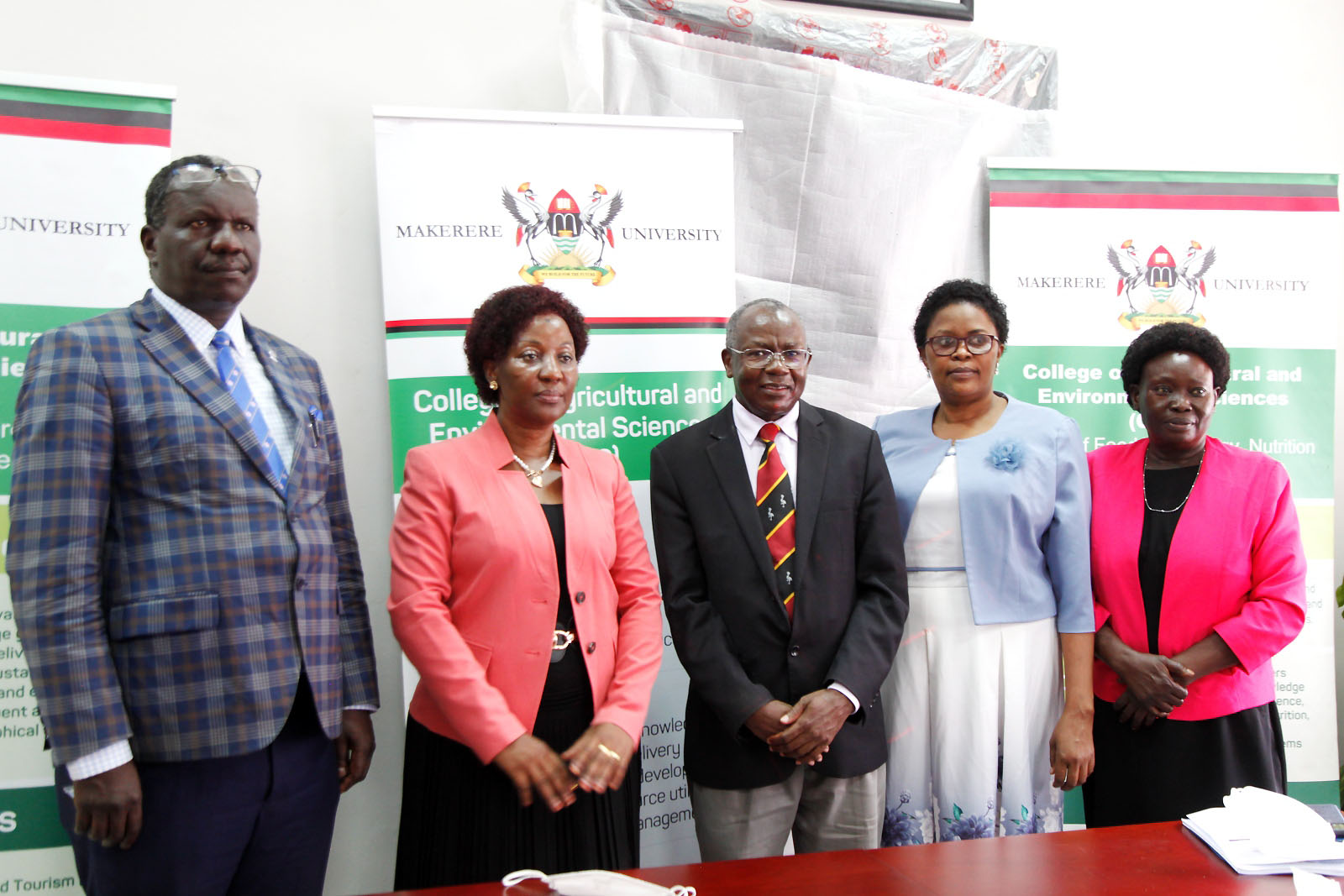
Makerere University Chancellor, Prof. Ezra Suruma appointed Dr. Gorettie N. Nabanoga as the next Principal of the College of Agricultural and Environmental Sciences (CAES), Makerere University effective 1st February 2022. She is the first female Principal of CAES and will hold the position for a period of four years as stipulated in the Universities and Other Tertiary Institutions (Management of Constituent Colleges of Makerere University) Statute, 2012. Dr. Nabanoga who has been Deputy Principal, CAES takes on from Prof. Bernard Bashaasha who has served in the position since August 2013.
CAES Structure
CAES is composed of three schools and eight Departments. The schools are; Agricultural Sciences; Forestry, Environmental and Geographical Sciences; and Food Technology, Nutrition and Bio-Engineering. The School of Agricultural Sciences is composed of three Departments namely; Agricultural Production; Extension and Innovation Studies; and Agribusiness and Natural Resource Economics. The Departments under the School of Forestry, Environmental and Geographical Sciences include; Forestry, Biodiversity and Tourism; Environmental Management; and Geography, Geo-informatics and Climatic Sciences. The School of Food Technology, Nutrition and Bio-Engineering is made up of two Departments-Food Technology and Nutrition; and Agricultural and Biosystems Engineering.
The College also hosts several research institutes and centres namely; Makerere University Agricultural Research Institute Kabanyolo (MUARIK), the Makerere University Biological Field Station (MUBFS), the Food Technology and Business Incubation Centre (FTBIC), Makerere University Regional Centre for Crop Improvement (MaRCCI), Makerere University Centre of Excellence in Waste Management, Makerere University Centre for Climate Change Research and Innovations (MUCCRI), Makerere University Centre for Soybean Improvement and Development (MAKCSID), the National Biodiversity Data Bank (NBDB) – Uganda, Uganda Forestry Resources and Institutions Centre (UFRIC) – Makerere University, Continuing Agricultural Education Centre (CAEC), and a Consortium for Enhancing University Responsiveness to Agribusiness Development (CURAD). Others are; the Centre for Mountain Resources and Disaster Management, Rangeland Resources Centre, and the Agricultural Policy Analysis Centre. In addition, the College is composed of several administrative units including; the Office of the Bursar, Office of the College Registrar, Human Resource Office, Procurement and Communications.
During her four-year tenure as Principal, CAES, Dr. Gorettie N. Nabanoga will provide academic and administrative leadership to 373 members of staff and over 3,000 students in the aforementioned Units.
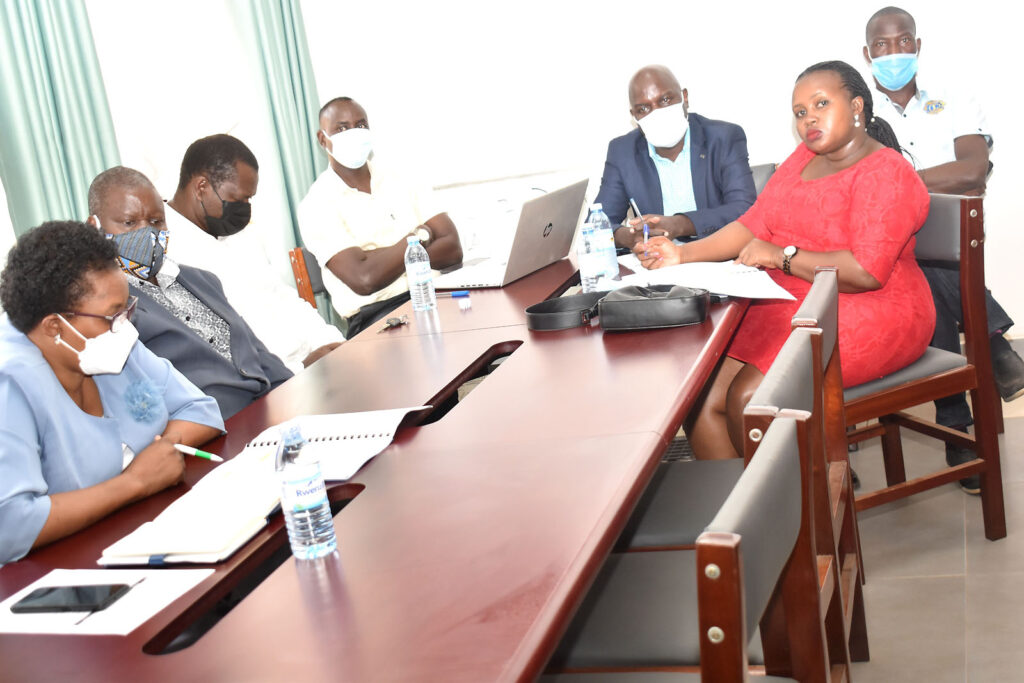
Handover ceremony
Today, 15th February 2022, the outgoing Principal, Prof. Bernard Bashaasha handed over to the new Principal at a ceremony witnessed by the Representative of the University Secretary, Ms. Consolata Komugisha; the Director Internal Audit, Mr. Walter Yorac Nono; as well as the Deans and Heads of Academic and Administrative Units at the College.
Presenting his handover report, Prof. Bashaasha congratulated the new Principal upon her appointment and briefed her on a number of issues relating to the status of CAES programmes; assets; ICT infrastructure; student enrolment; registration and graduation statistics; E-Learning; research, innovations, and outreach programmes; online presence and publicity; human resources; the financial status of the college; as well as the achievements registered; challenges experienced over the years, and the pending tasks.
Achievements registered during Prof. Bashaasha’s term of office
Key achievements registered under Prof. Bashaasha include increased student enrolment. As at December 2021, CAES had a total of 2,922 registered students. Of these 2,758 (94.4%) are undergraduate students and 164 (5.6%) are graduate students (Masters and PhD). Other achievements include growth in graduation statistics from 362 undergraduates in 2013 to 467 in 2021, and 122 graduate students in 2021 (with 21 PhDs) from 83 in 2013 with only five PhDs. There has also been accelerated research output resulting into a total of 331 publications in 2021 from 164 in 2018. “The College also revamped the Makerere University Agricultural Research Institute Kabanyolo (MUARIK) Bulletin into Makerere University Journal of Agricultural and Environmental Sciences (MUJAES),” Prof. Bashaasha noted. According to the outgoing Principal, the College has widened research collaborations locally and internationally, established a research grants office and laid the foundation for the CAES Research and Ethics Committee (REC) to support the ethical aspects of research. “An interim REC Committee has been appointed and the application is with the National Council for Higher Education,” he explained.
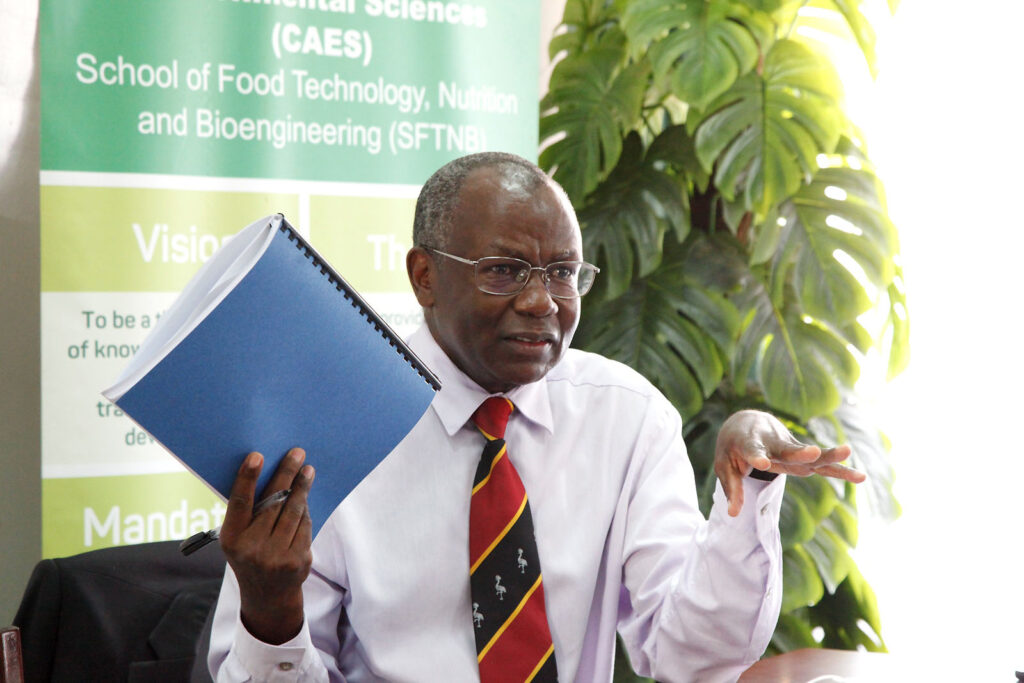
Other achievements include; enhanced visibility of CAES through the website and other online platforms, the college quarterly newsletter, annual reports and other IEC materials; rehabilitation of research laboratories and facilities at MUARIK including the Diary Value Chain; establishment of a Botanical Garden at MUARIK, increased number of research centres and institutes; enhanced transport facilities; 50 Zoom licenses procured to support blended teaching and learning; increase in number of programmes to 13 undergraduate and 24 graduate – a total of 6 new programmes have been developed during the last 8 years and another 6 programmes are in the pipeline; increase in the number of research institutes and centres; increase in the number of high level research innovations; procurement of a standby generator for the College; and above all enhanced teamwork at the College. “We inherited a college divided in opinion and strategy. We have managed the diversity and coalesced into one CAES family working together for the good of the College, University and nation,” he said.
Key Research, Innovations and Outreaches
The College of Agricultural and Environmental Sciences (CAES) undertakes basic, strategic and applied research and development in the broader areas of agriculture, food technology and nutrition, forest management, and environment and natural resources management.
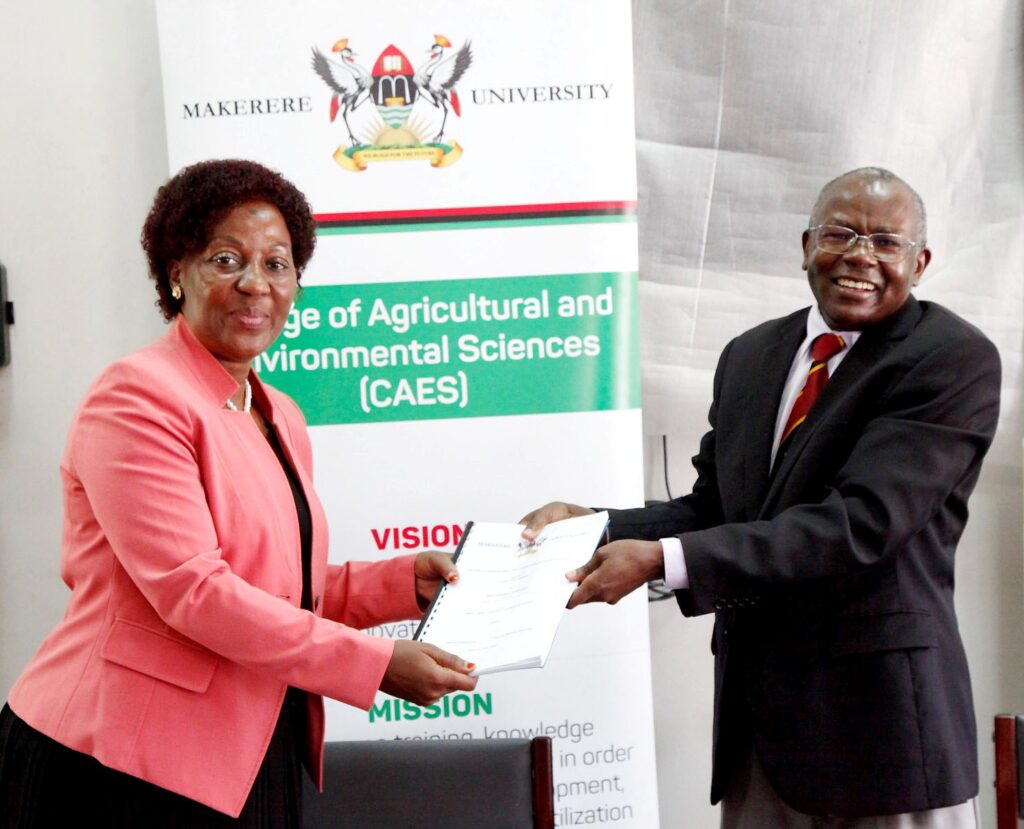
In agriculture, research and development programmes have focused on enhancing farmer-centred approaches, climate smart agricultural systems, value chain improvement for the achievement of food and nutritional security, livelihood improvement and overall rural development. The College has also pioneered R&D in biotechnology, integrated pest and disease management, linking producers to markets as well as incubation of innovation for market products.
The key research achievements include;
- Launch of crop breeding programmes on disease and drought tolerant cowpeas and sorghum by the Makerere University Regional Centre for Crop improvement (MaRCCI)
- Construction of a Graduate Training and Research Laboratory building at MUARIK
- Development of a hybrid dryer, automatic communal borehole, 3D thermal imaging for the pots (value added potatoes), refractive window drying technology for fruits, and a solar irrigation pump
- Development and release of a new soybean variety – Maksoy 6N
- Establishment of a pig semen lab at MUARIK
- Making diesel from recycling plastics
- Making organic pesticides from agricultural waste
- Invention of a three-wheeled multi-purpose farmers’ tractor – MV MULIMI, and;
- Signing of various MoUs on research and innovations
Challenges experienced
Despite the achievements, the College has experienced a number of challenges. These include; erosion of staff, depleted transport facilities, lack of data to support blended teaching and learning, underfunding, limited research funding, lack of a budget for MUARIK, non-registration and overstay on programmes by graduate students, limited teaching space, and depleted ICT facilities. Prof. Bashaasha implored the new Principal to follow up on a number of issues including; pending appointments and replacement of retired staff in critical units – appointment of a graduate programmes coordinator and a dedicated registrar to support graduate students’ registration. He also appealed to her to follow up on the operationalization of the College Research and Ethics Committee and the Grants Office, pending results, mobilization of CAES alumni to support the establishment of the College Endowment Fund, and the rehabilitation of facilities in the College.
Appreciation to staff
Prof. Bashaasha appreciated Makerere University Management and all staff for the cooperation and support accorded to him during his term of office. He pledged continued support to the new Principal and all staff at CAES.
Remarks by Dr. Gorettie N. Nabanoga
In her communication to members of staff at CAES, Dr. Gorettie N. Nabanoga appreciated the Search Committee, Senate and Council for recommending her for the position. She expressed gratitude to the CAES fraternity for their support. “I wish to thank the Search Committee, Senate and the University Council that identified me as the most suitable candidate. My appreciation to all the colleagues at CAES that encouraged, supported and provided mentorship. I will forever be grateful for the trust you have placed in me, and I commit to work tirelessly to deliver on my mandate as Principal, CAES,” she stated.
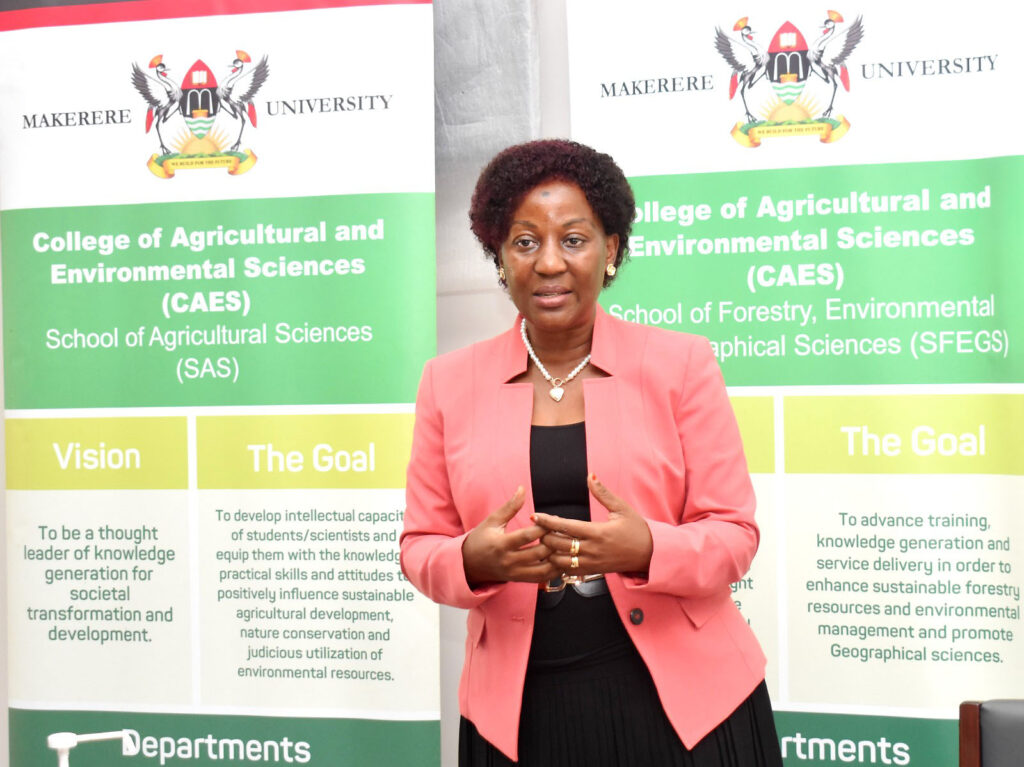
Similarly, Dr. Nabanoga extended appreciation to the outgoing Principal, Prof. Bernard Bashaasha. “I wish to pay tribute to Prof. Bernard Bashaasha who has steered CAES for the last 8 and a half years with utmost dedication and professionalism. Thank you so much for your commitment to serve CAES. It is great honour and privilege to succeed you and build upon the significant transformations you have made at CAES. I thank you for all the support offered to me as your Deputy, which enabled me to gain management experience and advance my professionalism.”
She equally appreciated her contenders, Prof. Jacob Godfrey Agea and Dr. Patrick Okori for offering themselves for the position. “It showed the zeal and motivation you equally have to serve this university and CAES fraternity in particular. “We may have had slightly different visions and strategies to move CAES in the next 4 years, which if consolidated, shall get the College to the desired level much faster. I pledge to seek and integrate your brilliant ideas, and also harness your networks within and outside the University,” she noted. Dr. Nabanoga acknowledged the support of the former and current Deans and Heads of Department.
Pledge to serve
Getting the Journey started, Dr. Nabanoga pledged to steer the College Management to deliberate on how best to cascade the University Mantra of a Research-Led University, and thus, nurture the CAES that everyone will be proud of. “Through this process, all voices shall contribute to co-creating winning strategies as we nurture the CAES we shall continue to be proud of. I reiterate my aspirations of having a united, harmonious and progressive CAES and, I continue to count on your support, even much more than you did when I served as Deputy Principal. I Pledge to serve you with utmost professionalism,” she stated. Dr. Nabanoga pledged to maintain an open-door policy during her term of office. The open-door policy will not just be about leaving my office door open, but reaching out to all staff to establish their psychological wellbeing and to seek views on how to manage the College better,” she explained.
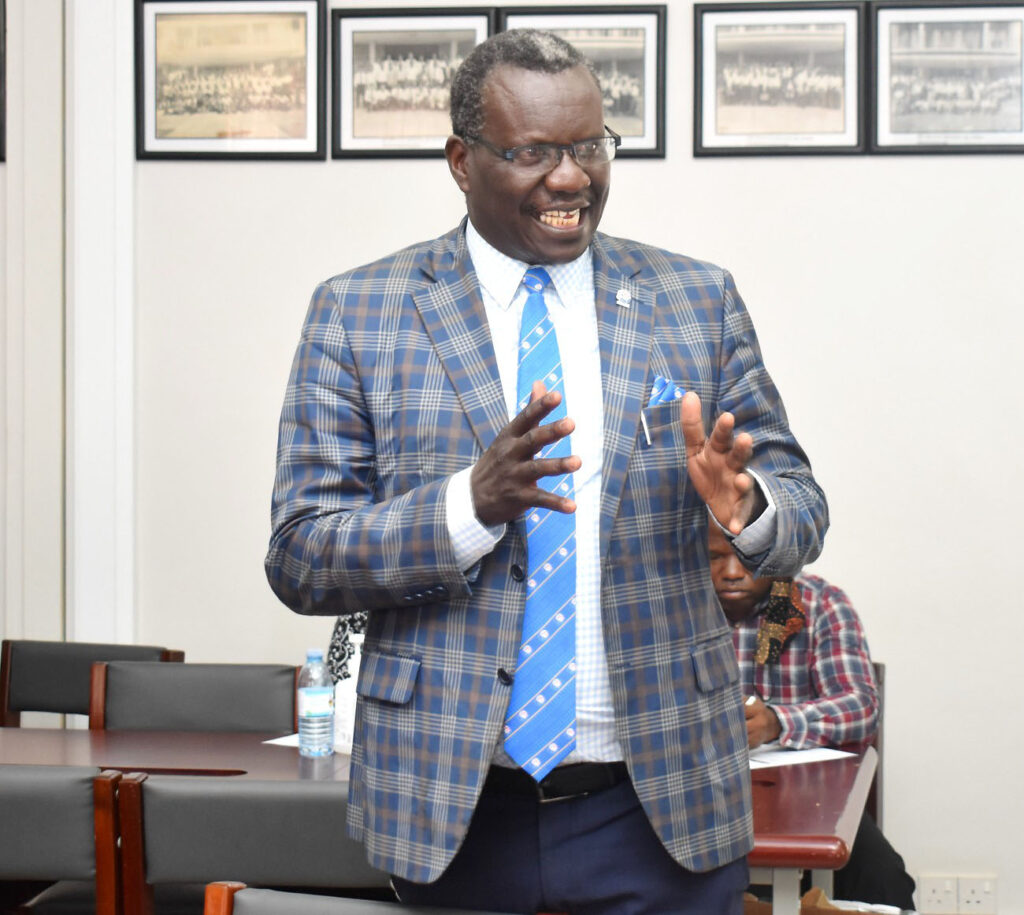
In his remarks, the Director Internal Audit, Mr. Walter Yorac Nono congratulated the new Principal upon her appointment and appreciated the outgoing Principal for the commitment and dedication that steered CAES to greater heights. “Prof. Bashaasha has come out strongly to defend CAES programmes in various Management engagements and I highly commend him for that,” he said.
The Representative of the University Secretary, Ms. Consolata Komugisha congratulated Prof. Bashaasha for the achievements registered over the years, noting that CAES had not experienced any serious financial challenges under his tenure. She congratulated Dr. Nabanoga upon her appointment as the first female Principal of CAES and pledged to support her. Commenting on the budget cuts that have led to insufficiency in most of the Units, Ms.Komugisha implored Dr. Nabanoga to work towards managing staff expectations, endeavouring to explain and opening up to staff on the situation at hand.
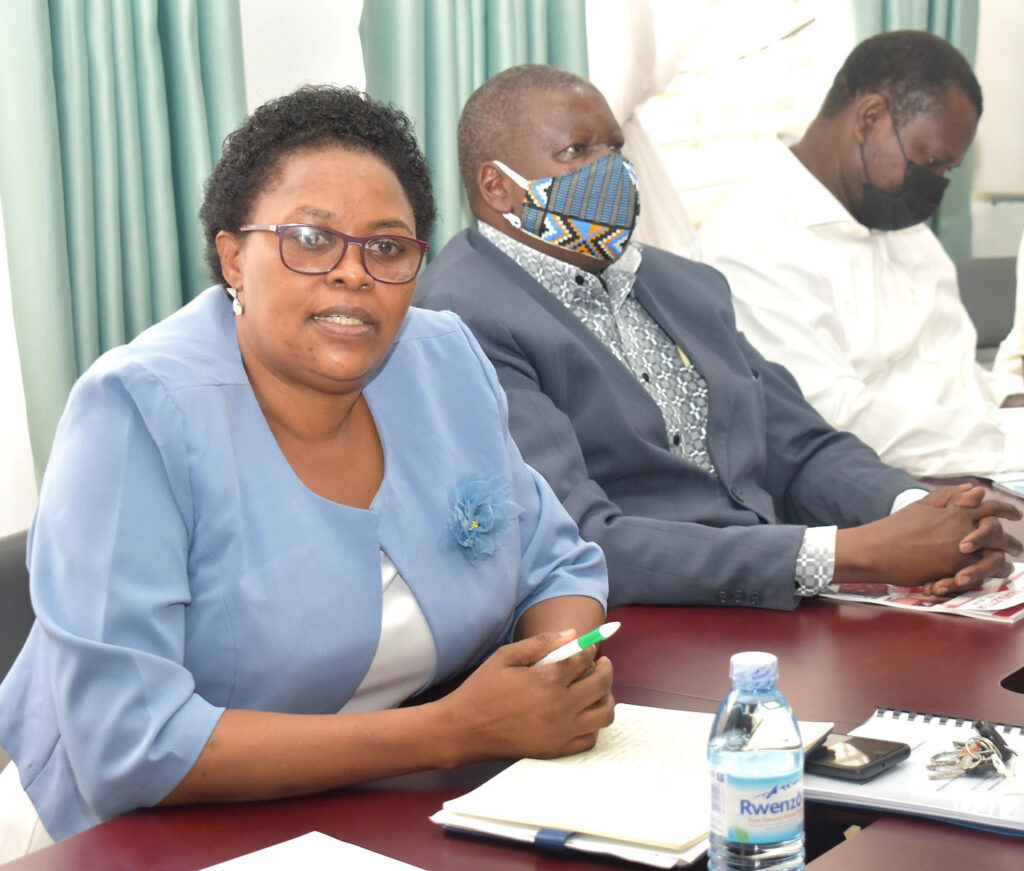
The College Human Resource Officer, Ms. Hawa Harriet congratulated the new Principal and appreciated the outgoing Principal for the cordial working relationship.
On behalf of all staff and students of CAES, the Dean, School of Food Technology, Nutrition and Bio-Engineering, Dr. Abel Atukwase welcomed the new Principal and pledged to support her to advance the mandate of CAES. He appreciated the outgoing Principal for the cordial relationship, mentorship and guidance over the years and appealed to him to continue supporting the College.
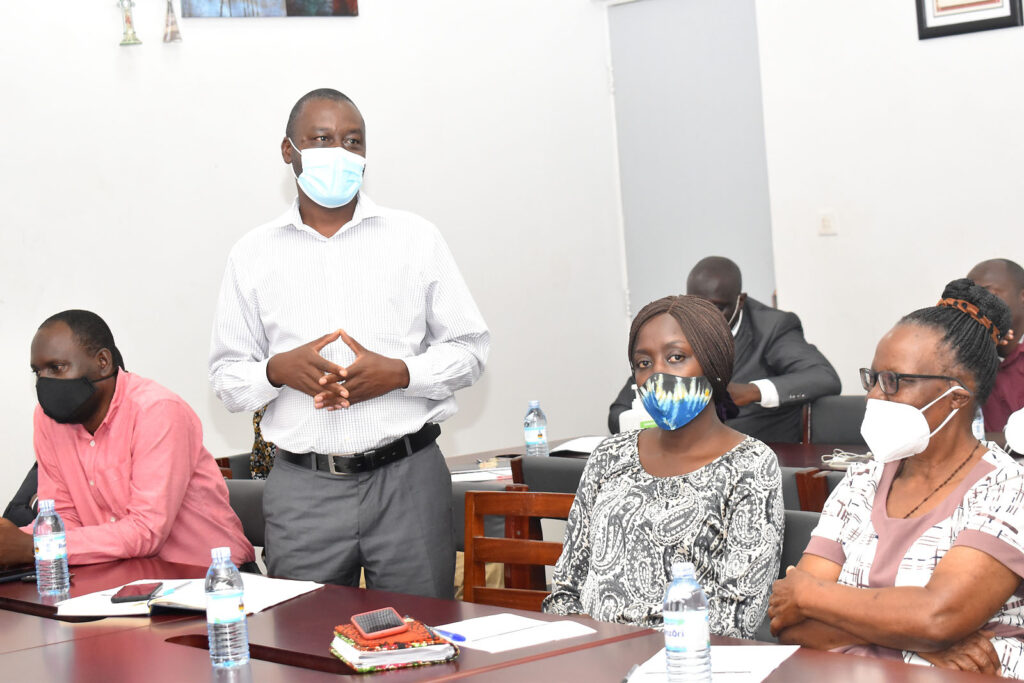
Profile of the New Principal Dr. Gorettie N. Nabanoga
Dr. Gorettie N. Nabanoga is innovative, goal-oriented, dependable, trustworthy, open-minded, easy going yet a perfectionist. She enjoys co-creating ideas, learning, unlearning and re-learning when engaging with teammates. She endeavours to always use these qualities in her personal and professional engagements.
She is a Christian, Ugandan citizen, born in 1969. She holds a PhD-Social Sciences; with research in Gender and Natural Resources Management, Wageningen Agricultural University, The Netherlands; a Master of Science in Management of Natural Resources and Sustainable Agriculture (MNRSA), Norwegian University of Life Sciences, Norway; a Bachelor of Science in Forestry, Department of Forestry, Makerere University, Uganda, and she completed her ordinary and advanced levels of education from Mt. St. Mary’s College Namagunga, Uganda.
Dr. Nabanoga completed her 4-year Bachelor’s Degree in Forestry with an Upper Second Honors Degree of Makerere University in 1993 and has since served Makerere University growing through the academic ranks from Teaching Assistant to currently Associate Professor.
She has also held several administrative and academic leadership portfolios in the University; starting as the first female Head, Department of Community Forestry and Extension, Faculty of Forestry and Nature Conservation-MAK for 8 years; the first female Dean of Faculty of Forestry and Nature Conservation-MAK for 3 years; the first female Deputy Principal, College of Agriculture and Environmental Sciences, Makerere University for 8 years; and now the first female Principal, College of Agriculture and Environmental Sciences, Makerere University. She has also served the University on several management committees as Member of the Inaugural Board of Directors, Makerere University Holdings Company for 7 years; Chair, Procurement Sub-committee, Makerere University Holdings Company for 6 years; Chair, Research and Innovations Sub-committee, of the Change Management Committee of the URARFC, Makerere University for one year; Member of the Search Committee for Principal and Deputy Principal for the College of Health Sciences; Member of the Senate Committee in the formation of the Gender Mainstreaming Directorate (GMD); Member of Makerere University Governing Council- Science Senate representative and Member of Makerere University Senate.
She has supervised several undergraduate and graduate students and mentored staff and students, many of whom have risen though the academic ranks under her mentorship; edited a Book, published two Book Chapters, several publications in peer reviewed journals and mobilized close to US$ 14 million research grants through international collaboration with several development agencies and Universities such as Agricultural University of Life Sciences, Norway (UNMB), Norwegian University of Science and Technology (NTNU), Lund and Uppsala Universities, Sweden, Wangeningen University, The Netherland, Yale University, USA, Connell University, USA, Michigan State University USA among others. And regional Universities such as Stellenbosch University South Africa; Sokoine Agricultural University, Tanzania; the University of Addis-Ababa, Ethiopia; Egerton University, Kenya as well as many Universities, Ministries, Departments and Agencies in Uganda. She has also been part of a number of consultancy teams local, regional and international.
In fulfilling the University’s outreach and community service mandate, Prof. Nabanoga is currently serving as the Vice Chairperson, Board of Directors – Buganda Cultural and Development Foundation (BUCADEV); and Member of Technical Working Committee (TEWOCO) for the Consortium for enhancing University Responsiveness to Agribusiness Development (CURAD). She previously served as an Advisory Board Member, Uganda Martyrs University – Masaka Campus; Chair, Uganda Martyrs University’s Advisory Board Academic Planning Committee – Masaka Campus; Vice-chairperson, Board of Advisors – Environmental Management for Livelihood Improvement Bwaise Facility (EMLI); and Patron – Buganda Kingdom Environment Development Association. In the private sector, she is one of the Directors, Royal Suites Hotel (a 20 US million dollar 4-Star Suite Hotel with about 130 employees) located in Bugolobi, Kampala Uganda-. Award winner of the Investor of the Year Award in 2003 and Kalanoga Resort (a 2 US million dollar Resort with about 50 employees) located 2km off Kajjansi-Munyonyo Highway, Busabala Road Junction, Kampala, Uganda.
Prof. Nabanoga is a Uganda National Academy of Science (UNAS) Fellow, a member of the Society for Conservation Biology (SCB); Uganda Society for Science and Technology (USST); Norwegian Friends of Uganda (NUFA); Uganda Forestry Association (UFA): and Buganda Kingdom Development Programme-Agro Sector.
You may like
-


Mak News Magazine: February 2026
-


CAES Presents Overall Best Performing Student in the Sciences & a Record 28 PhDs at the 76th Graduation Ceremony
-


Graduation marks the next phase of accountability, graduates told
-


Over 9,200 to graduate at Makerere University’s 76th Graduation
-


76th Graduation Highlights
-


Mak Selected to Host Alliance for African Partnership Africa Office
Agriculture & Environment
CAES Presents Overall Best Performing Student in the Sciences & a Record 28 PhDs at the 76th Graduation Ceremony
Published
7 days agoon
February 25, 2026
The College of Agricultural and Environmental Sciences (CAES) presented the best performing student in the Sciences at the 76th Graduation Ceremony of Makerere University. Ms. Esther Ziribaggwa graduated with a CGPA of 4.77 in the Bachelor of Agricultural and Rural Innovation. She credits her success to resilience and hard work, despite the financial challenges she faced during her studies.
The four-day 76th graduation ceremony commenced on 24th February 2026 with the CAES, the College of Computing and Information Sciences (CoCIS), the College of Education and External Studies (CEES), and the School of Law presenting graduands for the award of degrees and diplomas of Makerere University.

CAES Graduation Statistics
CAES presented a total of 561 students (238 female and 323 male). Of these 28 (10 female and 18 male) graduated with PhD, 144 (68 female and 76 male) with Masters, 380 (157 female and 223 male) with Bachelor’s degrees, and 9 with Post graduate diplomas (3 female and 6 male). The PhD graduates included; Mr. Ainebyona Ronald Rwambuka, Ms. Amongi Winnyfred, Ms. Apil Jenifer, Mr. Asizua Denis, Mr. Astatke Dejene Kebede, Ms. Atuhairwe Privah, Ms. Ayesiga Stella Bigirwa, Mr. Biryomumaisho Dickson, Ms. Cherotich Harriet, Mr. Kalimunjaye Samuel, Ms. Kesiime Vasiter Eunice, Ms. Khakasa Elizabeth, Mr. Kimbowa George, Mr. Komi Gentle Wilson, Mr. Kusiima Kaheesi Samuel, Mr. Mathe Lukanda Musondolya, Mr. Mukama Innocent Hope Tinka, Mr. Mukengere Bagula Espoir, Mr. Nakhokho Evans Martin, Ms. Faridah Nalwanga Sendagire, Ms. Nalweyiso Amina, Ms. Nampijja Zainah, Ms. Njenga Peninah Wambui, Mr. Nkurunziza Gelase, Ms. Ojera Alal Ato Gertrude Miriam, Mr. Sebuliba Richard Mutumba, Mr. Shimali Fred, and Mr. Ssubi Allan Johnson.

Overall graduation Statistics
During the course of the 76th graduation ceremony, a total of 9,295 students will graduate with degrees and diplomas of Makerere University. Of these, 4,262 (46%) are female and 5,033 (54%) are male. A total of 213 students will graduate with PhDs, the highest number in the history of the University; 2,503 with Masters degrees; 6,343 with Bachelor’s degrees; 206 with postgraduate diplomas, and 30 with Diplomas.
Postgraduates constituted 31.4% of the total number of graduands.
Remarks by the Vice Chancellor
Addressing the congregation, the Vice Chancellor of Makerere University, Prof. Barnabas Nawangwe, congratulated the graduates on reaching this significant milestone. “You graduate today from one of the finest universities in the world,” he said. “You have distinguished yourselves through discipline, integrity, and academic excellence, and we are immensely proud of you. The qualifications you carry are vital to society. We have equipped you with the knowledge and skills to secure employment or to create enterprises that will, in turn, employ others. Should you not find immediate employment, do not despair, instead, reflect on the vast opportunities around you and rise to the challenge as entrepreneurs. Do not despise humble beginnings. To our PhD graduands, you now join the global community of scholars. Africa looks to you with great expectation. Use your expertise to transform our continent.”

He appreciated the parents and guardians for the sacrifices they made to support their children’s education.
New Research Excellence Recognition Plans
The Vice Chancellor informed the congregation that beginning with the 76th graduation ceremony, the University will recognize outstanding PhD students who are members of staff. He congratulated those who completed their doctoral studies in record time while continuing to serve without study leave, commending their resilience and leadership. “These will receive the Makerere PhD Resilience Award”.
Similarly, the University will henceforth honour the best PhD and Master’s theses, as selected by the Higher Degrees Committee of Senate. The students with the top 10 theses at the 76th graduation are: Kawesi Paul – MA Law (School of Law), Katende Stephen – MSc Quantitative Economics (COBAMS), Najjinda Shamirah – PhD Management (COBAMS), Turyahabwe Irene – MSc Molecular Biology (COVAB), Tayebwa Dickson – PhD (COVAB), Batte Herbert – PhD Mathematics (CONAS), Ssekago Arnold – MSc Mathematics (CONAS), Namiyingo Julian – PhD Literature (CHUSS), Namata Brenda – MSCO (CHUSS), and Tayebwa Asaph Kamau – MBA (MUBS).

Recognition of the CAES Research Output
In his remarks, the Vice Chancellor commended the College of Agricultural and Environmental Sciences for spearheading transformative research aimed at strengthening Africa’s food systems. Among the initiatives he highlighted was the Healthy Soy Project, funded by the Danish Ministry of Foreign Affairs, which seeks to develop sustainable, affordable, and nutritious soy-based foods to combat child stunting in Uganda and other climate-affected regions. He also cited a project focused on enhancing value addition in cocoa production through the development and scaling of a single fermentation box technology, now adopted by more than 70% of farmers in major cocoa-producing districts.

Efforts to Transform Makerere into a Research-led University
The Vice Chancellor noted that Makerere University continues to advance steadily toward becoming a truly research-led institution – one that generates knowledge to empower communities, strengthen industries, and drive national transformation.
He expressed gratitude to the Government of Uganda for entrusting the University with resources to support more than 1,400 high-impact research and innovation projects under the Makerere University Research and Innovations Fund (Mak-RIF). The Fund has enabled researchers to provide practical, evidence-based solutions in sectors including agriculture, land management, energy and minerals, peace and security, and education. Through Mak-RIF, over 200 PhD students have received support to pursue their research, many of whom are graduating at the 76th graduation ceremony.

The Vice Chancellor further highlighted the pivotal role of the Makerere University Technology and Innovations Centre (MUTIC) in advancing incubation and commercialization. “The Centre offers mentorship, business development training, intellectual property support, and industry linkages to help transform research outputs into viable enterprises. To date, eleven spin-off companies have been established by students and staff, while the University’s Innovation Pod (UniPod) has incubated more than 100 projects in the past year. The short-term target is to establish 50 spin-off companies annually, with plans to double that number in the long term.”
In partnership with the Science, Technology and Innovation Secretariat in the Office of the President, the University has also introduced awards to recognize outstanding researchers and innovators. “The Innovation Commercialization Award underscores the institution’s commitment to translating research into practical products, services, and technologies that address real-world challenges and support national development,” the Vice Chancellor noted.

Prof. Nawangwe appreciated the Government of Uganda for securing a USD 162 million loan from the Korea Exim Bank to support critical infrastructure development at the University. The funding will facilitate the construction of new facilities for the School of Medicine, School of Dentistry, School of Engineering, the Science and Technology Centre, and the completion of the School of Computing and Information Sciences- an unprecedented development in the University’s history.
He also thanked development partners who provide research grants and scholarships, including the MasterCard Foundation, European Union, Norwegian Agency for Development Cooperation, Swedish International Development Cooperation Agency, International Development Research Centre, Korea International Cooperation Agency, German Academic Exchange Service, National Institutes of Health, Centers for Disease Control and Prevention, United States Agency for International Development, Wellcome Trust, KfW, Inter-University Council for East Africa, Regional Universities Forum for Capacity Building in Agriculture, African Research Universities Alliance, the PLUS Alliance, the Worldwide Universities Network, the Association of African Universities, the Alliance for African Partnership, the Madhvani Foundation, and the Government of Uganda through the Higher Education Students Financing Board.

He further acknowledged the Embassy of China, the Chinese Chamber of Commerce, various government ministries, State House, and private sector partners – including Stanbic, Absa, NCBA, DFCU, and Centenary Bank-for their continued support.
Remarks by the Chancellor
In his remarks, the Chancellor, Hon. Dr. Crispus Kiyonga, appreciated the parents, guardians, and sponsors whose unwavering support enabled the students to succeed.
“At the heart of the graduands’ accomplishments are the professors, lecturers, and administrators of the University, ably supported by the University Council. It is only fitting that we acknowledge and commend them for a job well done,” he noted.

He further extended profound gratitude to H.E. Yoweri Kaguta Museveni and the NRM Government for the invaluable financial and other support extended to the University.
Going forward, he encouraged the University Administration to strengthen research funding, forge stronger partnerships with the private sector to commercialize innovations, deepen structured engagement with communities, and fully leverage the abundant technological resources available to the institution.
Message from the Minister of Education and Sports
The Minister of Education and Sports, also First Lady, Hon. Janet Kataaha Museveni, represented by Hon. Dr. Joyce Moriku Kaducu – Minister of State for Primary Education, commended the Vice Chancellor and the leadership of Makerere University for upholding the standards that continue to distinguish the University across Africa and beyond.

She expressed gratitude for the spirit of constructive collaboration among management, staff, students, and development partners, noting that such cooperation is vital for institutional growth and academic excellence. She paid special tribute to the University Council, particularly the Chairperson and its members, for their dedicated oversight and stewardship. Their commitment to transparency and good governance, she observed, has strengthened public confidence in this historic institution.
A major milestone highlighted by the Minister was the establishment of the Makerere University Research and Innovation Fund (RIF), which supports high-impact research aligned with national priorities and development goals. Through this initiative, thousands of researchers and innovators have developed practical, scalable solutions that are transforming communities and key sectors across Uganda.

She reaffirmed the Ministry’s commitment to strengthening higher education through expanded research funding, digital transformation, cultural reform, and stronger collaboration between academia and industry. “The vision is clear: universities must not only produce graduates, but also solution-makers and job creators”.
Implementing the Competence-based Education and Training
Reiterating a key directive from the Ministry of Education and Sports, she emphasized that all institutions of higher learning must prepare for the full implementation of Competence-Based Education and Training by July 2027. “This reform represents more than a policy shift. It signals a fundamental transformation in how graduates are prepared, with greater emphasis on practical skills, innovation, and problem-solving.”

She urged the Vice Chancellor and his team to lead in curriculum reform, staff development, and infrastructure enhancement to ensure the successful rollout of competence-based education.
The Minister further urged university management to ensure that all satellite campuses are fully accredited and that their programmes meet the same high standards of quality and relevance as those offered at the main campus. This, she stressed, is essential to safeguarding the integrity of the University’s degrees and effectively serving students nationwide.

Addressing the graduates, she noted that Uganda and Africa need innovators to modernize agriculture, engineers to build quality infrastructure, healthcare professionals to strengthen health systems, and educators to inspire future generations. “The world you are entering is dynamic, interconnected, and technologically driven. Artificial Intelligence is reshaping industries; climate change is redefining agriculture and urban planning; and global markets are transforming employment patterns. In this rapidly evolving landscape, you must remain adaptable, creative, and committed to lifelong learning.”
Address by the Commencement Speaker, Prof. Nicholas Ozor
In his address titled Knowledge with Purpose and Service with Integrity, the Commencement Speaker, Prof. Nicholas Ozor, Executive Director of the African Technology Policy Studies Network, urged the graduates to embrace lifelong learning, prioritize purpose over comfort, build character before career, and serve something greater than themselves. He encouraged them to believe in Africa and take action, rather than waiting for solutions from elsewhere.

Addressing the graduates of CAES, he emphasized that they stand at the intersection of survival and sustainability. “In a world confronting climate change, food insecurity, and environmental degradation, your knowledge is vital. You will work with farmers, ecosystems, land, water, and policy. You will shape food systems and livelihoods. Respect indigenous knowledge, embrace scientific innovation, and champion sustainability. The future of Africa depends on how well we feed our people and protect our land.”

Research Excellence and Innovation Commercialization Awards
During the graduation ceremony, Makerere University recognized the top researchers and innovators from the 10 Colleges. At CAES, Dr Mugabi Robert from the School of Food Technology and Nutrition received the Overall Top Researchers Award, 2026; Dr. Nalwanga Sendagire Faridah received the Best Early Career Researcher Award, Dr Mugabi Robert scooped the Mid-Career Research Award whereas Prof. Yazidhi Bamutaze got the Senior Career Research Award. Prof. Phinehas Tukamuhabwa, Dr Ephrahim Nuwamanya, Assoc. Prof. Ahamada Zziwa, and Dr Ssempijja John Edson were recognized among the best innovators.

More about Esther Ziribaggwa, the overall best performing student in the sciences:
Agriculture & Environment
Mak hosts First African Symposium on Natural Capital Accounting and Climate-Sensitive Macroeconomic Modelling
Published
2 weeks agoon
February 20, 2026
African economies are increasingly exposed to climate-related shocks that threaten development gains, fiscal sustainability, and macroeconomic stability. From extreme weather events and biodiversity loss to the depletion of natural capital, climate risks are reshaping economic realities across the continent. Yet many macroeconomic frameworks used in public finance and planning continue to overlook climate and nature-related risks and the long-term benefits of resilience and adaptation investments.
To address this emerging reality, over 250 participants from Africa, Europe and beyond, convened at Makerere University – Kampala, on the 12th and 13th of February 2026, to participate in the First African Symposium on Natural Capital Accounting and Climate-Sensitive Macroeconomic Modelling.
Following the theme, “Climate-Sensitive Macroeconomics: Rethinking Growth in Africa’s Natural Resource Base, the hybrid symposium organized by Makerere University through the Centre of Excellence for Africa Climate-Sensitive Macroeconomic Modelling (CEACM) within the School of Economics, under the College of Business and Management Sciences (CoBAMS), the Environment for Development Initiative (EfD), and the Ministry of Finance, Planning and Economic Development (MoFPED) in Uganda, brought onboard ministers, leading economists and planners, researchers, policy makers, the academia, development partners, climate change experts and the media.
The Symposium being the first of its kind on the continent, reflected Africa’s growing determination to work collectively in confronting shared development challenges, building on recent momentum such as the formation of Pan-African Finance Ministers Forum for Climate Action (PAFMCA).
Featuring speeches and presentations from notable speakers and partners, a keynote address on Natura Capital Accounting and Climate Change Nexus in Africa and their impact on Fiscal Policy, panel discussions, expert opinions, and exhibition kiosks (World Café), the symposium presented a platform to strengthen Africa’s analytical and institutional capacity to integrate climate and natural capital considerations into macroeconomic and fiscal policy.
Vice Chancellor underscores the role of universities
Welcoming the delegates to Makerere University, the Vice Chancellor-Prof. Barnabas Nawangwe emphasized that universities must lead innovation and collaborative research efforts to support collective climate change mitigation across the continent.
In the same vein, he advocated for strong collaboration between universities in Africa and government Ministries. “Makerere’s collaboration with the Ministry of Finance, Planning and Economic Development, stands as a shining example of how academia and government can strengthen economic management,” he said.

Prof. Nawangwe revealed that the collaboration between Makerere University and the Ministry, has strengthened macroeconomic modelling, fiscal policy analysis, and technical capacity within government. In addition, the partnership led to the establishment of the Centre of Excellence for Africa Climate-Sensitive Macroeconomic Modelling, bridging academic scholarship with real-world policy application.
“We have jointly established the Centre of Excellence for Africa Climate-Sensitive Macroeconomic Modelling. The Centre (established in August 2025) is anchored within the School of Economics in the Department of Policy and Development Economics, under the Master of Science in Economic Policy and Investment Modelling, a program jointly facilitated by Makerere University, the Ministry of Finance, Planning and Economic Development and the Bank of Uganda,” he mentioned.
Climate and Economic transformation are inseparable
The Vice Chancellor highlighted the critical intersection between economic transformation and environmental sustainability, noting that economies in Africa, heavily dependent on natural resources, face unprecedented pressures from climate shocks, biodiversity loss, and environmental degradation. Convinced that economic growth cannot be pursued in isolation from climate and environmental realities, he stressed the importance of integrating natural capital accounting and climate considerations into national development strategies.
Prof. Nawangwe advocated for shared responsibility of universities, research institutions, and policymakers to develop innovative analytical tools, responsive policy frameworks, and strong institutional capacities that promote sustainable growth while safeguarding environmental assets for future generations.
The Vice Chancellor commended UN PAGE and the Global Green Growth Institute (GGGI) for funding the symposium, as well as, other stakeholders namely the European Union and the Coalition of Finance Ministers for Climate Action (CoFMCA), Ministry of Water and Environment (MoWE), National Planning Authority (NPA), Uganda Bureau of Statistics (UBOS), the National Environment Management Authority (NEMA) for being reliable partners.
Integrating Climate into Fiscal Policy
During the opening ceremony, the Minister of Finance, Planning and Economic Development, Hon. Matia Kasaija underscored the urgency of embedding climate considerations into economic planning.
“As Ministers of Finance, we are often confronted with difficult trade-offs. Our task is to balance the needs of today with sustainability for future generations,” said Hon. Kasaija, in a speech read by Hon. Henry Musasizi, the Minister of State for Finance (General Duties).

The Minister guided that traditional macroeconomic models focusing only on growth, inflation, and fiscal balance are inadequate in an era of climate shocks. He affirmed that African economies are facing interconnected challenges which directly impact economic growth. He stressed that traditional macroeconomic frameworks must evolve to systematically incorporate environmental degradation and climate shocks, whose consequences can no longer be ignored in policy analysis.
“For countries such as Uganda, whose development prospects are closely linked to natural resources and the climate-sensitive sectors, these challenges are not abstract. They affect livelihoods, public finances and long-term economic resilience,” he mentioned.
The Minister emphasized that natural capital accounting and climate-sensitive macroeconomic modelling are vital for valuing natural assets, assessing environmental costs, and guiding sound investment decisions.
Protecting Africa’s Natural Capital
Hon. Beatrice Atim Anywar, Minister of State for Environment, emphasized the urgent need to protect Africa’s ecosystems. “Africa stands at a defining crossroads. Our economies remain anchored in natural capital—forests, water resources, biodiversity, land, and ecosystems—which sustain life, generate fiscal revenue, and underpin development,” she said.
She warned that climate-related shocks are already undermining growth and public investment. “Floods, droughts, land degradation, biodiversity loss, and water stress are no longer distant risks. They are present realities, already affecting productivity and macroeconomic stability,” she said.
She emphasized the need for improved economic models that account for environmental and climate risks: “Traditional macroeconomic frameworks have not adequately captured climate risks or the long-term economic benefits of resilience and adaptation. This limits our ability to make informed policy decisions as Africa pursues economic transformation, energy security, and fiscal stability,” she stated.
Hon. Anywar highlighted collaboration with GIZ, Makerere University, and government ministries, which led to the development of the MONCAP (Model for Natural Capital Policy Assessment). “This tool is being used to assess natural capital assets for climate change, energy transition, and their linkages to the macroeconomy. It supports budgeting by estimating the cost of depleted natural capital assets,” she said.
“Water security, forest conservation, ecosystem restoration, and climate adaptation are not costs. They are investments in Uganda’s long-term economic stability, productivity, and prosperity.”
Stakeholders urged to transform climate threats into opportunities
Adam Sparre Spliid, the Deputy Head of Mission, Danish Embassy said: “Integrating climate risk and natural capital into our macroeconomics frameworks is not only academic exercise, it is a massive de-risking strategy for private investment. By bridging the gap between government policy and planning, academia and research, and the private markets, we transform climate threats into tangible opportunities.”
Sustainability includes youth, jobs and human well-being
Dr. Steven Stone, Chair of the UN PAGE Management Board, emphasized that sustainability extends beyond the environment to encompass youth, jobs, economic growth, and human well-being. “While the environment is Africa’s foundational source of wealth, sustainable development requires balancing ecological stewardship with economic progress, including income and employment for the youth which are critical priorities for countries such as Uganda.”
Dr. Stone highlighted that UN PAGE, originating from the Rio+20 Conference, supports climate-sensitive economic policy in Africa, emphasizing that dialogue, scenario-building, cross-sector collaboration, and strong partnerships are key to advancing sustainable, inclusive, and climate-resilient development.
Africa’s Wealth Declining
In the keynote address titled, Natural Capital Accounting and Climate Change Nexus in Africa and their Impact on Fiscal Policy, Paul Jonathan Martin, Manager of Environmental Operations at the World Bank for Eastern and Southern Africa, and a specialist with over 30 years in climate and natural resources, warned that Africa’s overall wealth is under threat due to declining renewable natural capital.
“Produced capital has increased by 20%, human capital by a third, but renewable capital has declined by 30%,” Martin said. “When combined, Africa’s overall wealth trajectory has been weakening since 2010.”
He stressed that natural resources must be treated as economic assets requiring systematic accounting: “Africa’s rich natural resources are fundamental for sustainable development,” he said.
Citing examples from Ethiopia and Kenya, he highlighted successful integration of natural capital into public investment and budget decisions. “In Ethiopia, there are payments for ecosystems and investment prioritization tools. In Kenya, natural capital accounting integration into budgets has strengthened public investments. Climate change has deep, cascading effects across sectors, but Africa has major potential to lead climate solutions,” he said.

Martin also highlighted the economic benefits of climate adaptation: “From 2020–2050, the cumulative effect of adaptation on Uganda’s GDP is positive. Without action, under a dry/hot climate future, GDP could significantly deviate from projected growth paths.”
Drawing on insights from over 70 country climate and development reports produced by the World Bank, the keynote speaker highlighted the profound macroeconomic impacts of climate change across Africa. He stressed the importance of integrating climate and natural capital into macroeconomic planning. He noted that Africa’s forests, water systems, and biodiversity are vital for sustainable development but face growing threats from climate change, environmental degradation, and climate-related disasters that undermine productivity, public investment, and economic stability.
He observed that traditional macroeconomic models often fail to capture the value of natural assets and regulating ecosystem services, which are critical to both economic stability and resilience but are largely excluded from GDP calculations.
Africa-Led Solutions
Prof. Edward Bbaale, Principal, College of Business and Management Sciences (CoBAMS), stressed the importance of developing African-led solutions. “We need to champion the Africa-led model. We need approaches that fit our unique context. Africa is not here to take in other frameworks blindly,” he said.
By supporting research, training, policy dialogue and modelling innovation, the Centre of Excellence for Africa Climate Sensitive Macroeconomic Modelling (CEACM) positions Makerere University as a regional hub for advancing climate-sensitive macroeconomic policy across Africa.
He highlighted CEACM’s capacity-building programs: “Our goal is to ensure African Ministries of Finance have home-grown expertise to integrate climate and natural capital considerations into fiscal and macroeconomic policy. This is critical for long-term resilience and sustainable development,” he said.
The Principal explained that establishment of independent research centres enables Makerere University to go beyond traditional academic instruction and focus deeply on societal challenges, particularly those related to climate change, environmental degradation, and biodiversity loss.

He reported that the Centre of Excellence for Africa Climate-Sensitive Macroeconomic Modelling is structured to advance methodological innovation, develop new data systems, and strengthen climate-sensitive macroeconomic tools that are tailored to the African context.
MONCAP Model for Policy Assessment
Dr. Peter Babyenda, a member of faculty at CoBAMS, demonstrated MONCAP (Model for Natural Capital Policy Assessment), which integrates climate and natural capital variables into fiscal and macroeconomic planning.
“MONCAP allows policymakers to estimate the economic cost of depleting natural assets such as forests, wetlands, and water resources. It helps simulate policy options and determine how investments in natural capital yield long-term benefits,” Babyenda said. “We came up with this model to aid the Ministry of Water and Environment. This model is open—you can extend it,” he added.

He highlighted capacity-building initiatives, including short courses and the Master of Science in Macroeconomic and Investment Modelling, designed to train economists to incorporate natural capital and climate into policy planning.
International Perspectives
Sweetman Liam, Ireland’s Finance Minister, highlighted the economic value of ecosystems: “There is a deeper value of landscapes in flood prevention and biodiversity. Decision-making was informed, and people started understanding economic value,” he said.
Prof. Chukwuone Nnaemeka of the University of Nigeria emphasized collaboration with national statistical agencies: “We coordinate with the National Bureau of Statistics to develop natural capital accounting metrics. Increase the use of Natural Capital Accounting in decision-making,” he stated.
Technical and Parallel Sessions
The afternoon session featured three parallel sessions focusing on Natural Capital Accounting Methodologies and Best Practices, Climate-Sensitive Fiscal and Economic Modelling, and Natural Capital Accounting and Model Uptake and Use.
Drawing on diverse expertise, the panels highlighted innovative approaches and demonstrated that natural capital is not an environmental afterthought, but a central pillar of sustainable economic and policy planning.
The first day of the African Symposium drew to a close with interactive exhibitions at the World Café, where case studies and practical demonstrations highlighted innovative approaches to integrating climate and natural capital into economic planning. Participants actively engaged in discussions and networking, forging collaborations that promise to advance climate-sensitive fiscal and development strategies across Africa, setting a strong and optimistic tone for the days ahead.
Agriculture & Environment
Uganda Martyrs Namugongo Students Turn Organic Waste into Soap in an Innovative School Project on Sustainable Waste Management
Published
2 weeks agoon
February 20, 2026
*****The students were supervised by researchers from the College of Agricultural and Environmental Sciences (CAES) at Makerere University, led by Prof. Fred Kabi.
The garbage challenge
With urbanization rates rising rapidly across Uganda, municipal solid garbage generation in the country’s cities is projected to increase by more than 40 percent by 2050. The growing burden of unmanaged garbage, particularly organic garbage, continues to pose environmental and public health risks, underscoring the urgent need for innovative and sustainable solutions.
It is against this backdrop that Senior Four students of Uganda Martyrs Secondary School Namugongo undertook a project to demonstrate how local market garbage challenges can be transformed into opportunities for sustainable development.

Addressing the garbage Challenge
As part of their academic project under the competence-based curriculum, the students were tasked with identifying real-world challenges within their communities and developing practical solutions using locally available resources. Through research and field observations, they identified poor garbage management, particularly the accumulation of organic waste at major dumping sites such as Kiteezi Landfill, as a critical issue.
At these sites, unsorted solid garbage often accumulates uncontrollably, sometimes leading to collapses that pose serious environmental and public health risks including water contamination by leachates, persistent foul odors, and disease outbreaks.

Rather than solely viewing solid market garbage as a problem, the students recognized its untapped potential within the biodegradable fraction of market garbage streams. Their innovative solution was to convert organic solid market waste (biodegradable garbage) into an industrial raw material for soap production by utilizing saprophagous Black Soldier Fly larvae (BSFL) to accumulate lipids and applying the scientific process of saponification.
Makerere University Support to the project
The students’ project was supervised by Prof. Fred Kabi together with technicians from the College of Agricultural and Environmental Sciences (CAES) at Makerere University. Prof. Kabi and his team have been actively researching on Black Soldier Fly Larvae (BSFL) as a bio-waste management technology capable of converting biodegradable solid municipal garbage and farm waste into valuable by-products such as organic fertilizers, animal feeds, soap, and biodiesel.
Working in collaboration with Ento Organic Farm Uganda Ltd, the researchers have demonstrated how insect-based waste conversion systems can support a circular economy by transforming biodegradable waste into industrial raw materials.

According to Prof. Kabi, the five young garbage entrepreneurs (students) began their project by collecting information on household garbage management practices. After analyzing the data, they engaged stakeholders along the garbage value chain to brainstorm all-inclusive, source-based waste management strategies.
“The students developed a solution that links efficient waste management at garbage generation source to support production of organic fertilizer, insect protein for animal feeds, and soap, which is only possible with biodegradable garbage,” Prof. Kabi explained. “This approach of the Competence Based Curriculum (CBC) for lower secondary schools supports the concept of taking Makerere University to the community of budding scientists while promoting sustainable community development through a circular economy.”
From Market Waste to Soap Bars
The Team leader, Ms. Ivy Stephanie Kitali explained the step-by-step scientific process behind the project. The students began by collecting organic waste from local markets, which was then shredded to prepare it for the larvae as a substrate. “Black Soldier Fly larvae were then introduced to the prepared waste. The larvae efficiently consumed the organic matter, greatly reducing its volume while accumulating lipids (fats) in their bodies. After maturation, we separated the larvae from the remaining waste, euthanized through blanching and dried it. Oil was then extracted from the dried larvae using ethanol as a solvent. This lipid-rich oil became the primary ingredient or raw material for soap production. To enhance the final product, the larvae oil was blended with minute quantity of sunflower oil before adding sodium hydroxide, initiating saponification, the chemical reaction that transforms fats and oils into soap,” she explained. The process ultimately yielded usable bars of soap derived entirely from what had once been discarded as unwanted market waste/garbage.

Building Skills and Sustainable Innovation
Beyond producing soap, the project provided students with hands-on training in scientific research, waste management techniques, bio-chemistry, and sustainable innovation. They gained practical exposure to insect-based biotechnology and learned how environmental challenges can be addressed through science-driven by entrepreneurship.
Trending
-

 Humanities & Social Sciences1 week ago
Humanities & Social Sciences1 week agoMeet Najjuka Whitney, The Girl Who Missed Law and Found Her Voice
-

 General1 week ago
General1 week ago76th Graduation Highlights
-

 Health2 weeks ago
Health2 weeks agoUganda has until 2030 to end Open Defecation as Ntaro’s PhD Examines Kabale’s Progress
-

 Agriculture & Environment2 weeks ago
Agriculture & Environment2 weeks agoUganda Martyrs Namugongo Students Turn Organic Waste into Soap in an Innovative School Project on Sustainable Waste Management
-

 General2 weeks ago
General2 weeks agoMastercard Foundation Scholars embrace and honour their rich cultural diversity
